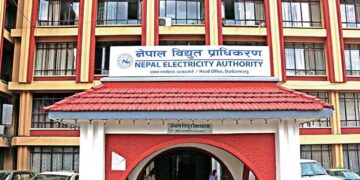Revenue generated by Nepal’s telecom service providers has fallen by nearly 28 percent over the past seven years, raising concerns about the long-term sustainability of the sector. According to the Nepal Telecommunications Authority (NTA), the two major telecom operators reported combined revenue of Rs 98.71 billion in FY 2017/18, which dropped to Rs 71.21 billion in the last fiscal year — marking a steady, multi-year decline.
The declining revenue has sharply reduced profits and weakened investment capacity. Experts warn that the absence of new revenue streams, coupled with regulatory and financial pressures, has pushed the industry toward a critical juncture. With income falling consistently, telecom operators have been unable to invest in essential infrastructure upgrades, including 5G deployment.
Telecommunications remains one of Nepal’s most heavily taxed sectors. Operators pay a 30 percent corporate tax — higher than the 25 percent applied to most other industries — in addition to multiple sector-specific taxes and fees. Former NTA Chair Bhesh Raj Kandel criticized this approach, arguing that telecom services should be treated as essential rather than luxury goods, and urged a comprehensive review of the tax burden.
Nepal Telecom (NT), in its latest annual report, attributed its declining revenue to policy obstacles, the rising popularity of over-the-top (OTT) communication platforms, and steep licence renewal fees. NT earned Rs 38.73 billion in revenue in FY 2081/82 but recorded only Rs 2.66 billion in profit — a steep fall from Rs 6.23 billion the previous year. The company spent a significant portion of its earnings on its GSM licence renewal alone, which cost Rs 20 billion last year, alongside heavy taxes and mandatory fees.
The sector’s contribution to the national economy has diminished as well. Telecom currently contributes only 1.2 percent to Nepal’s GDP and 3.4 percent to total government revenue. Ncell reported Rs 32.48 billion in revenue in FY 2024/25, of which Rs 16.98 billion — more than half — was paid to the government under 13 different tax and fee headings.
The company has submitted recommendations on the draft Telecom Act, calling for a restructuring of the tax and fee system. Ncell warned that without urgent tax reform, private-sector telecom operations could become unsustainable. Last year, Ncell paid nearly Rs 17 billion in GSM and ISP licence fees, telecom service charge (TSC), ownership tax, VAT, customs duties, TDS, advance tax, royalty, Rural Telecommunications Development Fund (RTDF) contributions, frequency charges, social service fees, and other taxes.
In FY 2023/24, telecom operators earned Rs 68.5 billion, paying Rs 37.7 billion to the government — more than half their revenue — according to NTA data.
Telecom companies currently pay 13 percent VAT, 10 percent TSC, 4 percent royalty, 2 percent RTDF contribution, and 2 percent ownership tax on SIM cards and landlines, among several other taxes. Experts note that Nepal now imposes the highest telecom tax rate among 10 Asia-Pacific countries. In contrast, China levies 6 percent VAT, India 18 percent GST, and Thailand 7 percent VAT.
Nepal ranks 119th globally in the GSMA Mobile Connectivity Index 2023, which highlights how countries with lower telecom tax rates tend to attract higher investment, enabling faster network expansion and improved service quality.
Studies by the World Bank and the International Telecommunication Union show that a 10 percent increase in broadband penetration contributes an estimated 1.3 percent to GDP growth.
Industry stakeholders argue that sector-specific taxes — including the 10 percent telecom service charge, 2 percent ownership tax, 4 percent royalty, and 2 percent RTDF contribution — should be abolished. Nepal Telecom, in its recommendations for the new Telecom Act, has proposed reducing the corporate tax rate from 30 to 25 percent and replacing the fixed Rs 20-billion licence renewal fee with a model that charges 8 percent of annual revenue over five years.










